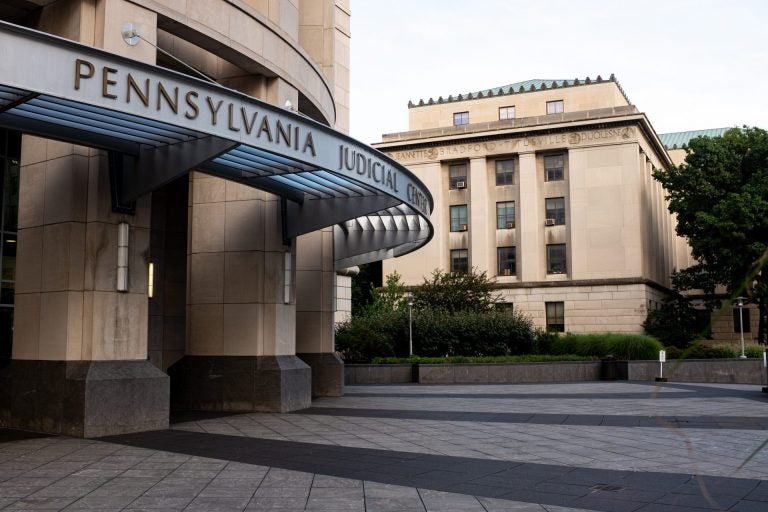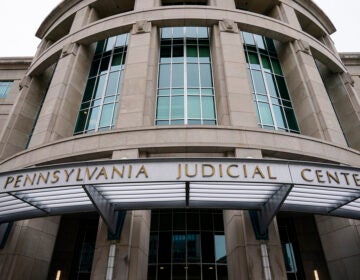Pa. election 2025: What to know about the Superior Court candidates
Brandon Neuman, Maria Battista and Daniel Wassmer are vying for an open seat, while Judge Alice DuBow is up for a retention vote.

The Pennsylvania Judicial Center in Harrisburg is seen on Aug. 19, 2019. (Ian Sterling/WITF)
What questions do you have about the 2025 elections? What major issues do you want candidates to address? Let us know.
In Pennsylvania’s 2025 general election, voters will determine who joins one of the commonwealth’s most powerful courts: the Superior Court, which handles thousands of criminal, civil and family appeals cases each year and is often the final word in justice for many residents across the commonwealth. The court’s decisions can shape everything from parental custody arrangements to criminal sentencing and consumer protections to business issues.
Three candidates — Democrat Judge Brandon Neuman, Republican Maria Battista and Daniel Wassmer of the Liberal Party — are vying for an open seat. Meanwhile, Democratic Judge Alice Beck DuBow is seeking a new 10-year term in a separate retention vote.
The Superior Court is one of two intermediate appellate courts in Pennsylvania, which review decisions from the state’s 67 county courts. The Superior Court has the final say on around 97% of its decisions which are not successfully appealed to the state Supreme Court.
“Do you want your communities to be safe? All criminal matters if appealed … go to the Superior Court. I ask people, ‘Do you care about your families, your children, your grandchildren?’ All matters related to families and children go to the Superior Court,” Maria Battista, the Republican nominee, told PCNTV last month. “Do you care about your property rights? Property issues go to the Superior Court.”
Here’s who is running:
Judge Brandon Neuman
Judge Brandon Neuman ran uncontested in the Democratic primary. He currently serves on the County Court of Common Pleas in Washington County, where he is a lifelong resident. He graduated from the University of Richmond and Duquesne University Kline School of Law, and practiced trial law before being elected to the Pennsylvania House of Representatives in 2017, where he served four terms. He ran for lieutenant governor but lost in the primary.
He says his time as a lawmaker shaped how he views the role of the appellate bench.
“You learn about how the law is created and then, as a judge, you understand that we are not lawmakers,” he said in an interview with PCNTV. “You have to respect and appreciate how hard it is to make a law and then take a step back as a judge and say we have to follow the law and the constitution. That is our job.”
His legislative work included authoring the Debbie Smith Act, which was aimed at ending Pennsylvania’s backlog of untested rape kits.
In a notable 2024 ruling, Neuman ordered Washington County to notify voters if their mail ballots contained errors that could prevent them from being counted, a decision that was upheld by successive higher courts.
He said he sees the judiciary’s biggest challenge as “rebuilding public trust” in an era of widespread skepticism toward government institutions.
“Right now, the courts generally have the lowest approval rating that they’ve had probably in modern history,” he said. “You don’t come to court voluntarily. It’s not something that you enjoy. And so really just making sure … that this process is going to be fair, it’s going to be impartial. I’m going to listen to you and I’m going to follow the law.”
The Pennsylvania Bar Association’s Judicial Evaluation Commission rated Neuman “Highly Recommended,” citing his judicial record and demeanor. He has received endorsements from several labor unions, including the American Federation of State, County and Municipal Employees Council 13, the Pennsylvania State Education Association, International Brotherhood of Electrical Workers and the Pennsylvania AFL-CIO. He is also endorsed by the Fraternal Order of Police Pennsylvania State Lodge, Pennsylvania State Troopers Association and Pennsylvania Sheriffs’ Association.
Maria Battista
Battista became the Republican Party nominee for the open Superior Court seat after she won the primary against Ann Marie Wheatcraft of Chester County.
Battista unsuccessfully ran for Superior Court in 2023 and has since worked for The Judge Group, a professional services agency. A native of Knox, Pennsylvania, Battista has served as an assistant district attorney in both Venango and Franklin counties, and has held counsel positions in the Pennsylvania departments of Health and State and was a contract specialist with the U.S. Department of Defense. She also briefly taught middle school.
In addition to her law degree from Ohio Northern University, she holds a doctorate in education from the University of Pittsburgh. Battista’s campaign emphasizes her extensive experience in civil, criminal and administrative law, and her commitment to an “efficient, accountable and transparent” judiciary.
Battista said she was inspired to pursue judgeship after the “cash for kids” scandal in Luzerne County where two Pennsylvania judges orchestrated a scheme to send children to for-profit jails in exchange for kickbacks.
“The conduct of two judges in that court impacted the lives of over 5,000 children,” Battista told PCNTV. “People lost trust in our judges and our court system. That’s why it’s so important to give a voice to the voiceless.”
She said her broad background equips her to understand complex cases, particularly those involving children and families. She said mental health and addiction remain at the core of Pennsylvania’s criminal caseload.
“If you would get rid of all of the mental health issues that are certainly plaguing our young … and the addiction issues that we have, about 80% of our criminal cases would go away,” she said.
The Bar Association rated Battista “Not Recommended” for failing to participate fully in its evaluation process. She has been endorsed by ChamberPAC, the political arm of the Pennsylvania Chamber of Business and Industry.
Daniel Wassmer
Liberal Party candidate Daniel Wassmer — an attorney, educator and former Bucks County solicitor — said his candidacy stems from a desire to restore independence to a politically polarized system.
“Judges are supposed to be nonpolitical even though they’re endorsed by political parties. I think we really need a third party,” Wassmer said. “We have this very divided nature about the way the two-party system works. And if you actually read the original Constitution, it was contemplated, contemplated that there wouldn’t even be political parties.”
Unlike his opponents, Wassmer is open about positions he takes on various issues. On his campaign website, he describes himself as a “constitutional realist” and outlines positions that, while not directly judicial, reflect his broader philosophy of government accountability. He also says that he is pro-choice, pro-Second Amendment, anti-war, against mass incarceration, pro-immigrant and a supporter of “LGBTQIA2S+ rights.”
While he acknowledges running as a third-party candidate is an uphill battle, Wassmer said he welcomes the challenge.
“I’m more than happy to lose an election if I’m not the person the taxpayers or voters choose,” he said. “The important thing is that people who run for office are servants of the public.”
Judge Alice DuBow | Retention vote
In the 2025 election, voters will not only choose a new face for the open seat on the Superior Court, they will also vote on whether to retain Judge Alice Beck DuBow, who has served since 2016. Retention elections in Pennsylvania are nonpartisan yes-or-no votes; judges need a simple majority to serve another 10-year term.
DuBow, a graduate of the University of Pennsylvania and Penn Law, was born in Delaware County and grew up in Montgomery County. She clerked for the Court of Common Pleas of Bucks County early in her career, practiced commercial and insurance-defense law in private firms, served as deputy counsel at Drexel University and later as a divisional deputy city solicitor for Philadelphia. Before election to the Superior Court, she served on the Court of Common Pleas of Philadelphia County.
Her mother, Phyllis Beck, was the first woman to serve on the Superior Court, and her daughter is a practicing attorney in New York. Dubow said she’s seeking retention to continue work she finds deeply meaningful.
“I have gained a tremendous amount of knowledge, not only knowledge of the law, but I’ve got another 10 years of life experience and I can use that in my decisions that I make,” she told PCNTV. “So I am running for another 10 years because I think I’m even a better judge now and I would like to continue to contribute for another 10 years.”
Dubow said appellate judging requires both fidelity to precedent but also an understanding of its evolution.
“I’m also going to put in my opinion that maybe it’s time that the Supreme Court take a look at their interpretation of this law because science has changed, culture has changed, and maybe it’s time for them to overrule that earlier case,” she said. “So following the law, but as I said, also adding some humanity to my decisions.”
Some of her decisions show a willingness to reverse lower courts’ decisions on cases from criminal justice to estates to business issues.
For example, she ruled that police went too far during a traffic stop and ordered evidence thrown out because it was collected after the initial reason for the stop had ended, making it an unconstitutional search. She also ruled a widow could not be forced to reveal private conversations with her late husband, reaffirming that Pennsylvania’s spousal-communication privilege still applies even after a spouse dies. She ruled that a landlord’s insurance company could sue tenants for fire damage because their lease didn’t make them co-insureds, reversing a lower court’s decision.
The state bar association rated her as “recommended for retention” citing “excellent judicial temperament,” fairness and opinions that are “thorough, thoughtful, well-reasoned and well-researched.”

Get daily updates from WHYY News!
WHYY is your source for fact-based, in-depth journalism and information. As a nonprofit organization, we rely on financial support from readers like you. Please give today.









